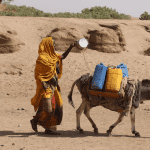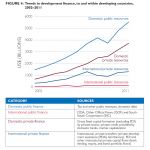Tackling the COVID-19 Hunger Crisis in Africa: How Digital Networks Can Empower Small Farmers and Avert a Looming Disaster
COVID-19 is bringing even the wealthiest nations to their knees, but it’s ultimately dealing the deadliest blow to the world’s most vulnerable people. While most African countries escaped the worst during the first few months of the global pandemic, the World Health Organization recently warned that the rate of infection across the continent is now escalating at an alarming pace.
According to WHO’s data, it took 98 days for Africa to reach an initial 100,000 cases and only 19 days to move to 200,000 cases. Cases doubled again to 400,000 over the next 20 days and took only a week to reach 500,000. Today, with cases roaring towards the one million mark, the virus has reached every nation on the continent. Perhaps most worrisome is the fact that this health crisis is rapidly turning into a hunger crisis. Food supply systems are breaking down as rural producers scramble to access the resources to grow food and deliver it to the people who need it, with the potential to lead to widespread hunger and even famine.
Averting these worst case scenarios will take a coordinated effort from governments, the private sector and humanitarian groups. But the challenge is not merely to help small farmers survive this crisis. These farmers are the backbone of the global food system, and they need resources not only to get them through COVID-19, but to build resilience in the face of the myriad threats that will continue to come their way, from climate change to conflict and natural disaster.
Farmers on the Front Lines
Small farmers feed up to 80% of the people in Asia and sub-Saharan Africa. Even before COVID-19 became a health crisis in their own countries, many of these farmers were feeling the effects of global economic shutdowns, from the collapse of West Africa’s cashew market to E.U. import bans that have strained Kenya’s economy. Meanwhile, a historic locust infestation in East Africa has come at the worst possible time, devastating a range of crops grown for both human consumption and fodder for livestock. Facing these rapidly multiplying disasters, farmers now find themselves on the front lines of the pandemic, risking their health as essential workers and struggling to prevent food shortages, all in the face of devastating economic fallout. Small-scale farmers urgently need assistance, but getting help to them is more complicated than ever. They need a range of financial, agricultural and technological resources to grow their crops, get them to market, and survive when crisis strikes again – and crucially, when multiple crises strike at the same time.
There is a persistent myth that most African farmers have only the most rudimentary tools and wouldn’t be able to benefit from advances in digital technology. In truth, large majorities of people across rural Africa use mobile phones. Their primary problem is not a lack of connectivity, but access to integrated solutions that meet their specific needs on a timely basis. Farmers must decide months in advance what their best bets will be for raising crops and livestock. As they make these critical decisions, a farmer in Kenya may need price information for the best maize seeds for her field, while another in Ethiopia may need financing and insurance to replant after drought. Another smallholder farmer in Nigeria with crops ready to harvest may require connections to buyers at a time when liquidity across food systems is drying up. And all of these farmers need access to accurate, real-time information about COVID-19’s risks and impacts.
Eight years ago, Mercy Corps launched AgriFin, which galvanizes networks of tech-focused partners to design, test and scale digitally-enabled resources for small farmers. AgriFin works to bundle services, integrating climate-smart satellite data from NASA, video-based learning tools from Digital Green and cutting-edge services from more than 100 other partners. It fosters connections that ensure farmers have all the resources they need to grow their crops and build resilience through an era of unprecedented drought, floods and pests. In the time we have been up and running, we have seen first-hand that there is no “one-size-fits-all” solution, but rather millions of very different farmers who each need timely and coordinated assistance matching their own conditions and markets. Our solutions are most effective and inclusive when they involve farmers directly as an active part of the design process and implementation.
Farmer Networks Take on the Twin Threats of Desert Locusts and COVID-19
Responding to the dual crises of locust swarms and COVID-19’s impact on health systems, the economy and food security, AgriFin and our partners have kicked into high gear. We’re aiming to reach some 15 million people with accurate, timely information about the pandemic, delivered via the network that is most effective for each farmer group – whether that’s WhatsApp and SMS hotlines, local TV and radio programs, Facebook Farmer Groups or other platforms.
In Kenya and Ethiopia, we’re partnering with Turn.io to leverage WhatsApp to provide a critical hotline for locust reporting and education, as well as COVID-19 support. In both countries, rural communities are part of the detection and response solution. Whether farmers are sending in a warning about locust sightings or asking how to identify symptoms of COVID-19, the hotline uses machine learning to respond, process data and direct services to the places they’re needed most. While the farmers are powering this citizen reporting network – especially useful for areas without much formal reporting from agricultural extension systems – we are also working with the Kenyan government and UN authorities to stream this farmer-supplied data into their response efforts.
Using Network-Based Solutions to Build a Resilient Future
AgriFin’s experience has demonstrated that helping small farmers is not about finding one silver bullet that will solve everything for everyone. What we need is a digital network of solutions that links all of the stakeholders – buyers, banks, government, farmer groups and tech innovators – to remove barriers to scale and get vital resources to farmers, fast.
We all hope that the COVID-19 pandemic will be a once-in-a-lifetime event – but the problems facing farmers are persistent. AgriFin has supported smallholder farmers through the challenges wrought by climate change, and now we’re seeing that these network-based solutions can pivot and adapt, to do more for them and the millions they feed. With global challenges only worsening, the pandemic shows how important it is to create responsive, adaptive digital solutions to support multiple threats, so that every small farmer has a network that can help them survive and thrive.
Leesa Shrader is the Programs Director for AgriFin Accelerate and AgriFin Digital Farmer at Mercy Corps.
Photo provided by author.
- Categories
- Agriculture, Coronavirus



